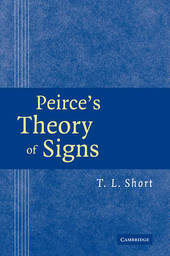
|
Peirce's Theory of Signs
Hardback
Main Details
Description
In this book, T. L. Short corrects widespread misconceptions of Peirce's theory of signs and demonstrates its relevance to contemporary analytic philosophy of language, mind and science. Peirce's theory of mind, naturalistic but nonreductive, bears on debates of Fodor and Millikan, among others. His theory of inquiry avoids foundationalism and subjectivism, while his account of reference anticipated views of Kripke and Putnam. Peirce's realism falls between 'internal' and 'metaphysical' realism and is more satisfactory than either. His pragmatism is not verificationism; rather, it identifies meaning with potential growth of knowledge. Short distinguishes Peirce's mature theory of signs from his better-known but paradoxical early theory. He develops the mature theory systematically on the basis of Peirce's phenomenological categories and concept of final causation. The latter is distinguished from recent and similar views, such as Brandon's, and is shown to be grounded in forms of explanation adopted in modern science.
Author Biography
T. L. Short is Chairman of the Board of Advisors to the Peirce Edition Project (Indiana University-Purdue University, Indianapolis). He has published broadly in the philosophy of science, conceptual change, teleology, and aspects of the philosophy of C. S. Peirce in journals such as The Monist, American Philosophical Quarterly, Grazer Philosophische Studien, Transactions of the Charles S. Peirce Society as well as in Biology and Philosophy, Synthese, and Semiotica.
Reviews'Peirce's Theory of Signs offers a wealth of philosophical riches just waiting to be mined.' Journal of Philosophy
|